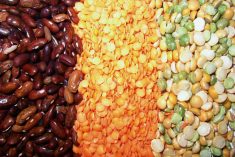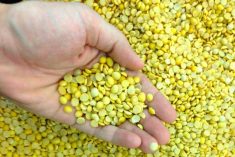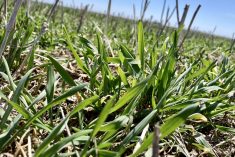Alberta-based grain and pulse handler and processor W.A. Grain + Pulse Solutions went into receivership April 26.
Farmers who delivered grain to its faculties in Alberta and Saskatchewan but haven’t been paid should contact the Canadian Grain Commission (CGC).
“We have not commenced a claims process yet,” CGC spokesman Remi Gosselin said in an interview Monday. “We’re simply collecting information from producers who are owed money.”
W.A Grain, headquartered at Innisfail, Alta., with facilities at Pambrun, Ponteix and Vanguard in southwestern Saskatchewan and at Bashaw and Bowden in central Alberta, had its licences suspended by the CGC April 20.
Read Also

Dryness poised to threaten Saskatchewan crops
Crops in Saskatchewan are developing in opposite directions, the province’s latest crop report said. Growing conditions in the province vary, with some areas receiving enough rain while other locations are experiencing crop stress due to hot, dry conditions.
That prevented the company from taking delivery of, or buying grain, or selling any grain in storage.
The CGC on Saturday issued one grain dealer licence and five primary elevator licences to W.A. Grain subject to a number of conditions, including that it not receive grain from farmers, purchase grain from farmers, “or otherwise incur liabilities to grain producers.”
Grain held in-store can only be sold by the receiver with the proceeds placed in an account that eventually will be used, along with security posted by W.A. Grain, to cover eligible farmers unpaid for their grain.
“The CGC conducted a primary audit to determine how much was held in inventory (by W.A. Grain), but we will take several weeks to complete a final audit to determine whether there is enough secuirty and grain inventory to compensate producers who are holders of primary elevator receipts and who are eligible claimants,” Gosselin said.
To be eligible claimants must have the proper receipts to prove they delivered grain to W.A. Grain. Under the CGC’s producer protection program farmers have just 90 days to make a claim after delivering or 30 days after getting a cheque.
Around 100 farmers are owed money for grain delivered to W.A Grain, Gosselin said. The CGC doesn’t know yet if revenue from stored grain and posted security will cover all eligible claims, he added.
“We have not commenced a claims process yet,” Gosselin said. “We’re simply collecting information from producers who are owed money.”
“Based on our initial audit most of what was held in-store was pulses, but the company also bought other crops.”
Gosselin said April 20 he couldn’t comment on what led the CGC to suspend W.A. Grain’s licenses until April 30.
Company owner Chris Chivilo told Alberta Farmer Express via email on April 26 that W.A. Grain has been dealing with a financial issue and had alerted the CGC to its situation.
“We were in constant contact with the CGC over the last couple of months appraising them of a situation with one of our creditors (bank) and were in agreement of the CGC licence suspension to protect producers in case of a worst-case scenario, which is unfolding now,” he said.
At risk
Several pulse crop buyers have recently experienced financial difficulties prompting the CGC to revoke their licenses and pay farmers using companies’ posted security.
The CGC suspended the licences of Canpulse Foods and Global Grain Canada and their parent company Globeways Canada last Oct. 31 when they were unable to provide security to cover farm liabilities.
All the farmers eligible for compensation were covered, the CGC announced March 2.
The CGC received 40 eligible claims involving Canpulse, totalling more than $3 million. There were 13 eligible claims for farmers dealing with Global Grain, worth nearly $700,000.
Global Grain’s liability was reduced because a number affected farmers were able to get their grain back, Gosselin said.
Two hundred and twenty-two ‘eligible’ farmers were paid a record $11.1 million through the CGC’s producer protection program in 2020 after ILTA Grain, which specialized in pulse crops, went out of business in 2019.
Unfortunately 49 farmers didn’t qualify because of the time limits. They collectively lost $1.5 million.
That’s why the CGC urges farmers to get paid as soon as they deliver.
While the CGC monitors licensed grain companies monthly, sometimes buyers can get quickly overextended.
Industry observers say pulse crop buyers are generally more at risk to financial problems for a combination of reasons.
Most are small companies with limited resources. Also, there are no futures markets for pulses so purchases and sales can’t be hedged. Pulse crop prices can often be more volatile.
Right now it’s also harder to get the containers used to export pulse crops.
— Allan Dawson is a reporter for the Manitoba Co-operator at Miami, Man.















